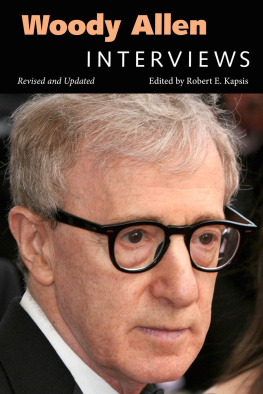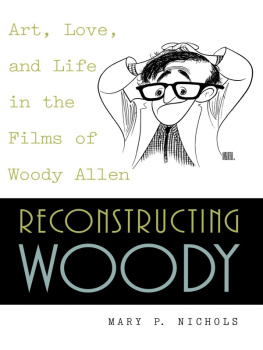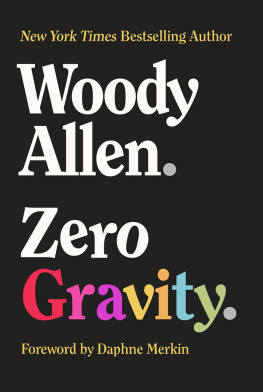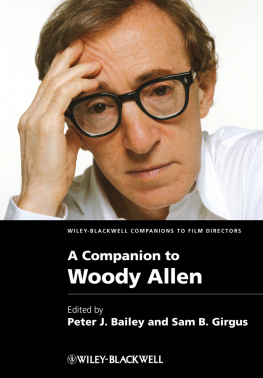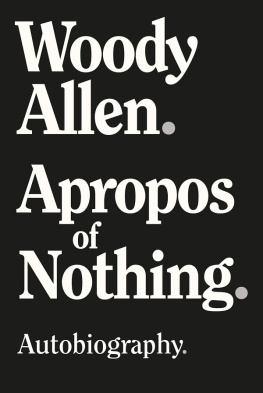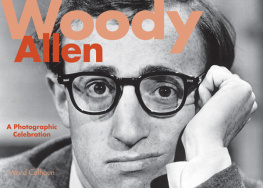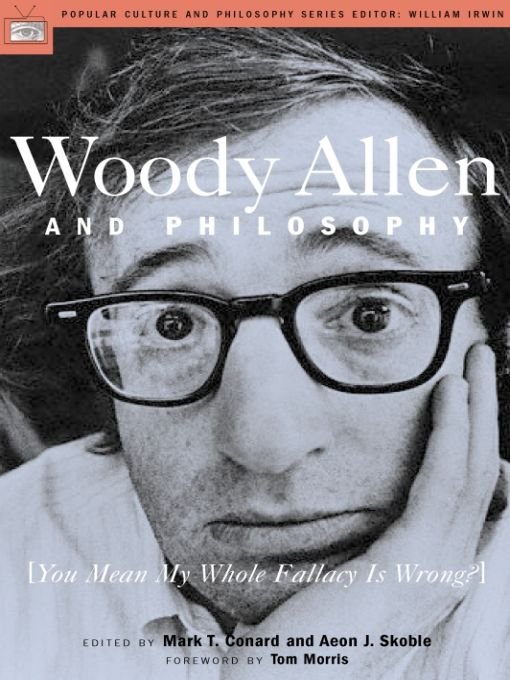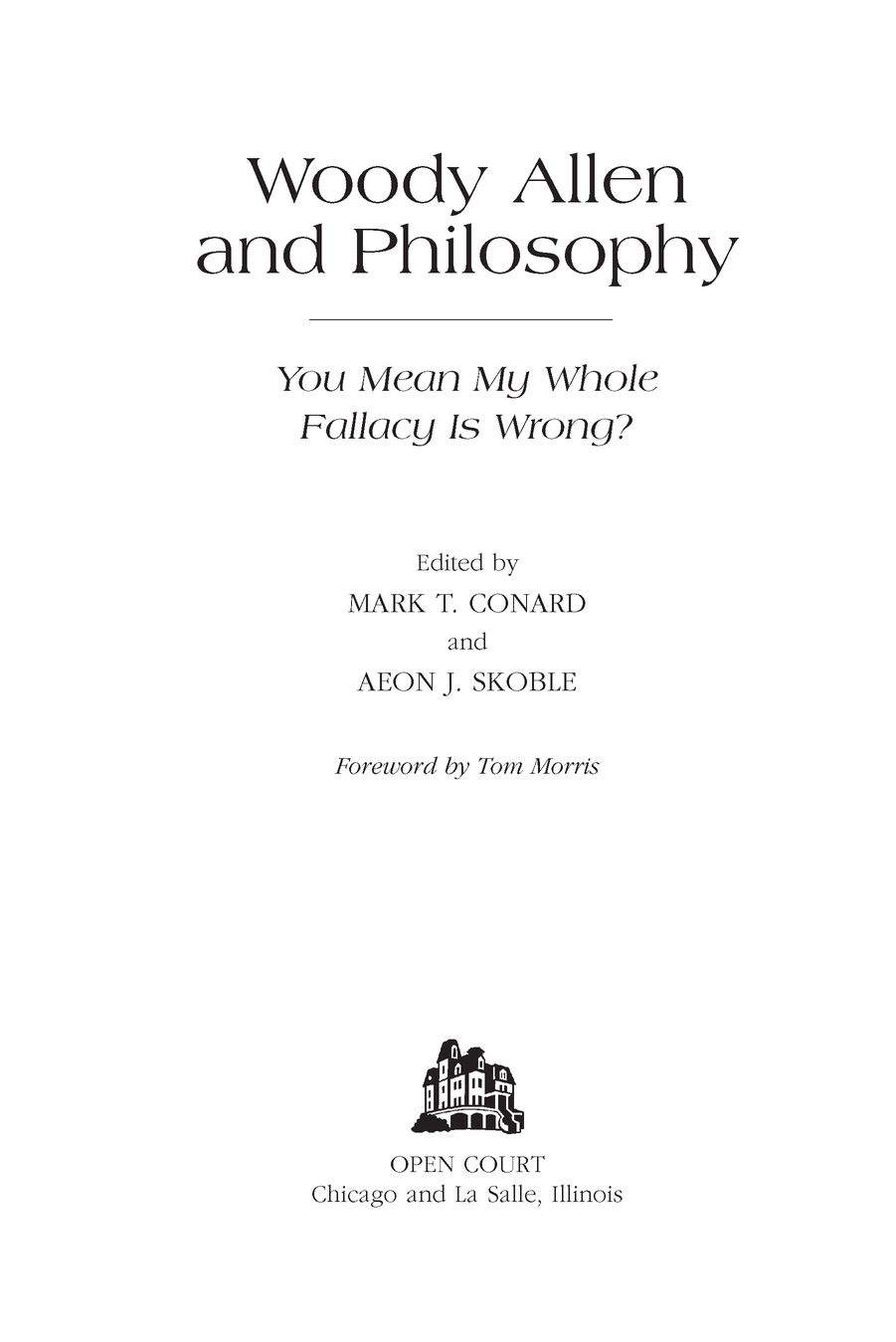Table of Contents
Popular Culture and Philosophy
Series Editor: William Irwin
VOLUME 1
Seinfeld and Philosophy: A Book about Everything and Nothing (2000) Edited by William Irwin
VOLUME 2
The Simpsons and Philosophy: The Doh! of Homer (2001)
Edited by William Irwin, Mark T. Conard, and Aeon J. Skoble
VOLUME 3
The Matrix and Philosophy: Welcome to the Desert of the Real (2002)
Edited by William Irwin
VOLUME 4
Buffy the Vampire Slayer and Philosophy: Fear and Trembling in Sunnydale (2003)
Edited by James South
VOLUME 5
The Lord of the Rings and Philosophy: One Book to Rule Them All (2003)
Edited by Gregory Bassham and Eric Bronson
VOLUME 6
Baseball and Philosophy: Thinking Outside the Batters Box (2004)
Edited by Eric Bronson
VOLUME 7
The Sopranos and Philosophy: I Kill Therefore I Am (2004)
Edited by Richard Greene and Peter Vernezze
VOLUME 8
Woody Allen and Philosophy: You Mean My Whole Fallacy Is Wrong? (2004)
Edited by Mark T. Conard and Aeon J. Skoble
IN PREPARATION:
Harry Potter and Philosophy (2004)
Edited by David Baggett and Shawn Klein
Mel Gibsons Passion and Philosophy (2004)
Edited by Jorge J.E. Gracia
Dedicated to the memory of John Atwell
Foreword: Can We Not Talk about Sex All the Time?
Philosophers love Woody Allen, in part, because he writes us into his movies. What other well-known filmmaker in our time has had philosophy professors as central characters in his films? For that fact alone, I believe the American Philosophical Association would give him a gold statue, if we could afford the gold. But even better, Woody Allen fills his films with the most important philosophical questions and ideas. Some are brilliantly expressed in dialogue. Others underlie the action. Since we have no award to present him for all this, we do the best we can. We show his movies in Philosophy 101. We crack his jokes in class. And we often see the surprised looks of students raised on Adam Sandler and Vin Diesel flicks when they first realize that you can actually grapple with important ideas on the big screen.
Of course, Woody Allen isnt the only creative thinker to deal with the deepest human questions in the context of drama. The ancient Greeks did a decent job of it long ago. And so did certain twentieth-century existentialists. But Woody is different. Hes a bit like Sartre or Camus, only funnier. No one can lead us to the edge of the cosmic abyss like Woody, and then hit us with a joke that somehow makes it all easier, and even more memorable. Not only is there no God, he quips, but try getting a plumber on weekends. And this comedic genius isnt just a comic. He has made some thoroughly serious films as well, with no jokes whatsoever. These also tend to be the ones with no audiences whatsoever. But they are all very well done, and extremely powerful in their explorations of the human condition.
Despite all his great wit and personal charm, Woody Allen is an atheistic existentialist with, understandably, strongly pessimistic inclinations on even a good day, which in his own estimation means when its raining hard. Every silver lining has a very dark cloud around itand who needs silver when even gold cant buy off death? Thats his perspective. But this cinematic genius is not just a messenger of gloom full of nihilistic neuroses, hes also a classic romantic as well. Hes a master at depicting our hopes and dreams as well as our foibles and fears. Vivid scenes in his films help us to understand the practical psychological impact of the deepest questions about life and death, and how tenuous all our answers can appear, especially in the hour before an important exam.
Woody Allen is not at all a philosopher in any academic sense, and his short stories and essays often poke fun at the professorial approach to the perennial issues. But he calls us all back to those gripping questions that get people interested in philosophy in the first place. What is morality? Is there really an objective difference between right and wrong? What is the meaning of life? Can there be justice in the universe? Is there a God? How should we think of death? Is philosophy just the ultimate sublimation of sex on the part of very intellectual people who cant get a date?
In a scene worthy of one of his films, a Yale undergraduate once approached me at the end of a class, three weeks into the new semester, wanting to transfer into my section of philosophy. Her current instructor insisted on dragging her through Thomistic metaphysics and mind-numbingly complex arguments. She looked totally exasperated while explaining this to me and said, He has no clue. I mean, the reason most of us take a philosophy class at all is so that, if were at a cocktail party sometime in the future and somebody mentions Plato or Aristotle, well know what theyre talking about. When you watch the films of Woody Allen, you may not come away with a lot about Plato or Aristotle, but you can end up quite well equipped to become a world-class cocktail party philosopher, with insights, anecdotes, and witticisms available for any theoretical occasion.
My own experience of the work of this great filmmaker and artist has been rich and varied. Manhattan is the only movie I have ever paid full ticket price to watch twice in the same week. I used clips from most of his movies in my most popular classes at Notre Dame, and found them endlessly stimulating for the students. I have written on his views concerning the meaning of life, and have as thoroughly enjoyed how he poses the problems as I have vigorously objected to how he gives his own answers. Woody will make you think. He may make you mad, or leave you depressed. But along the way he will make you laugh, and appreciate the ultimate questions in a deeper way than before.
I remember once sitting about twenty feet away from Woody as he played his clarinet with his incredibly good jazz band in a small club in New York. His concentration was astonishing. He seemed not to notice that there were other people in the room, in addition to the band. He was playing his music for the sake of the music itself, not to please the crowd. He didnt appear to be aware of the applause that ended each song, and the cheering that sometimes erupted after one of his solos. He was lost in the art itself, oblivious to all else.
Thats the way he is as a filmmaker. He has total concentration and lives in the art. He doesnt seem to notice whether his movies are reviewed, or how much money they make. He didnt show up for his Academy Award. He was too busy working on the next project, as lost in his art as he thinks we all are in the universe. He probably wont even be aware that this book exists. But all his fans should know that, finally, a group of careful thinkersreal philosophershas gotten together to explore and assess his work in a philosophical way. Some of these essays will make you laugh, and all of them will make you think. I believe that by the time you get to the end, youll applaud Woody as an unusually insightful artist and thinker. Of course, hell be too busy to notice your applause or mine, but he deserves it anyway.


